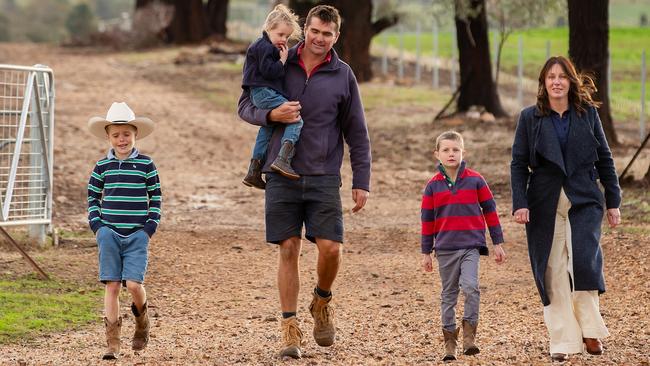Who’ll get the farm? Super tax threat to rural succession
The federal government’s proposed super tax on unrealised capital gains threatens the succession plans of thousands of farmers set to retire in the next decade.

The federal government’s proposed super tax on unrealised capital gains is threatening the succession plans of thousands of farmers set to retire in the next decade.
The tax, which would be impact self-managed superannuation funds worth more than $3 million, could see properties sold off rather than passed to the next generation within the funds, according to farming bodies and financial advisers.
Ms Katie Timms, a partner at RMS Australia, told The Australian that while about 10 per cent of her clients would be hit directly by the tax, about 40-50 per cent could be caught by the tax in cases where a spouse inherited superannuation after the death of a partner.
“I am nervous about the funds where the two members each has about $2 million dollars,” she said. “If one of them passes away, that obviously becomes a much bigger percentage of people who will be impacted.”
She said many farm people had SMSFs worth between $1.8 million and $2 million, but an ageing population meant many could end up with more than $3 million when a partner died.
The threat of the tax which would date from July 1 if it is passed by federal parliament, has alarmed farmers, many of whom have put farms into SMSFs and seen big increases in value because of the escalating land prices in the bush. Many have used this strategy as part of their succession plans but argue that with poor cash flow on many farms, they will have to sell assets to pay tax on “paper” capital gains.
The super tax represents a new challenge for Australia’s ageing farmers keen to pass on wealth to sons and daughters without selling up farms or incurring major tax costs that can make farms unsustainable. Farm succession planning has spawned an industry of advisers, lawyers and accountants in rural areas, as farmers grapple with the issue.
Law firm Cheney Suthers, based at Orange in NSW, recently released a report arguing that many farmers were unprepared for generational transitions. “The ageing farmer population is a pressing issue,” the report said. “A significant proportion of farmers are approaching or exceeding retirement age.”
A director at the firm, Kirsty Evans, who lives with her husband Tom on a property at Molong, 35 km from Orange, says orderly succession is important for the bush generally, not just for individuals.
“In the next decade 50 per cent of farms expect to change over with farmers retiring, and if we don’t have that formal succession plan in place, we’re going to see farms being broken up or sold to people outside the community,” she said. “That has a detrimental effect on rural communities, because you don’t see the cash flow back into the towns.”
Katie Timms says that using super to buy a second or third property has been a “really powerful strategy” for farmers.
“And it’s not always for tax purposes,” she said. “Sometimes it has been as part of a succession strategy, sometimes it’s been the ability to make your superannuation work for you in an investment class – farming – which you understand. Many farmers have not traditionally trusted superannuation but have been happy to build their super through rural land.
“They go, ‘I understand how to make money from farming, I understand that business, that’s where I want my retirement strategy to go. Rather than pay interest (on a bank loan) why don’t I use my superannuation balance to buy this parcel of farmland, knowing that, long term, I’m going to lease this to my son, and that will then provide me with a retirement income stream from an asset that I trust.’”
She said family trusts were an alternative vehicle in succession planning but the fact that superannuation assets are protected in cases of bankruptcy, made SMSFs an attractive option.
While in states like Western Australia, assets had almost doubled in value in recent years, market rents had not kept pace, leaving families without the cash flow to pay an unrealised capital gains tax. Land prices had risen in some cases because big corporations were buying land for carbon credits, not because farming was more profitable.
Timms said that a government crackdown on super concessions over the last decade meant that the SMSFs were less attractive for farmers’ succession strategies than they had been in the past.
“This idea that we’re putting these assets into super and they’re going to be able to stay there forever is wrong,” she said. “That might be the case in 1 per cent of the time. In 99 per cent of case, assets are cashed out when members die, wealth is passed on to the next generation and there has probably been capital gains tax paid or death benefits tax paid.”





To join the conversation, please log in. Don't have an account? Register
Join the conversation, you are commenting as Logout